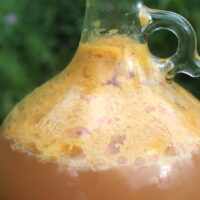Peach Wine
This simple recipe uses everyday pantry staples to make one gallon of homemade peach wine.
Servings: 1 gallon (4 bottles)
Equipment
- Wine Tannin 1 oz, Pectic Enzyme 1 oz, Acid Blend 2 oz Bundle
Ingredients
- 2-3 lbs peaches chopped
- 2-3 lbs sugar
- 1/8 tsp Tannin Powder or 1 Cup of Strongly Brewed Black Tea
- 2 tsp Acid Blend or 2 Tbsp. Lemon Juice
- 1 tsp Yeast Nutrient or 1/8 cup raisins
- 1 packet Premier Blanc Wine Yeast
Instructions
- Chop the peaches into a large bowl or half-gallon mason jar. Cover the peach slices with sugar, and stir every few minutes. The sugar will extract the peach juice in about 1-2 hours.
- Drain the peach juice into a fermentation vessel, and then use water to wash the peach pulp to remove the last bits of sugar and peach juice. Pour the water through a fine-mesh strainer and fill the fermenter to about 3/4 full, leaving space for the remaining ingredients.
- Brew a cup of strong black tea, remove the tea bag and add about 1/2 cup of the strongly brewed black tea into the fermenter. (Or just add winemaking tannin.)
- Add 2 tbsp of lemon juice into the fermenter. (Or just add 2 tsp acid blend for winemaking)
- Add raisins or yeast nutrient, but keep in mind if you add raisins they will float and you must filter them out before secondary to prevent surface mold down the line.
- Open the yeast packet and allow it to bloom in about 1/4 cup of lukewarm water for 5 to 10 minutes. Add the yeast into the fermenter. One packet is enough for 5 gallons of wine, so you can save some for other batches, or use the whole thing if you're not planning any other brewing in the near future.
- Add water to fill the fermenter to within a few inches of the top. Cap with a rubber stopper and give the whole thing a shake, careful not to drop it. Or, for the more conservative, use the handle of a long kitchen spoon to stir it up.
- Cap with an airlock and allow the mixture to ferment for about 10-14 days. When the fermentation begins to slow, siphon the mixture over into a clean carboy, leaving any sediment behind.
- Re-cap with a water lock and ferment for at least another 6 weeks, preferably longer such as 3 to 6 months. It may finish and clarify sooner, depending on your local temperature.
- Bottle the peach wine in clean, sterilized wine bottles with corks. Allow the peach wine to bottle age for at least 1 month, but preferably up to a year before drinking.
Notes
If at any point the airlock clogs with peach pulp, pull it off and clean it out before re-attaching it. This shouldn't be an issue if you've filtered the pulp through a fine-mesh strainer.
